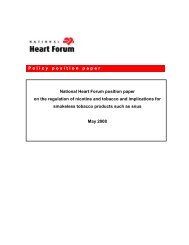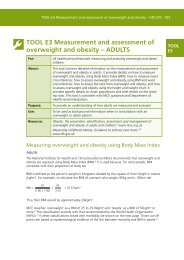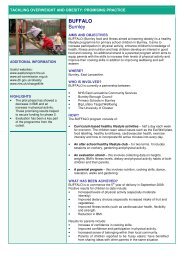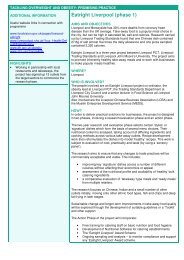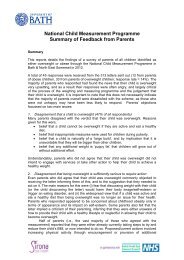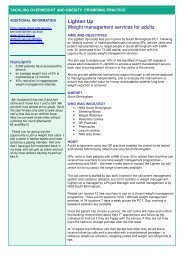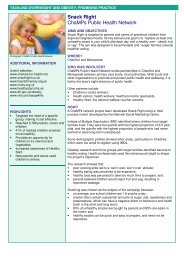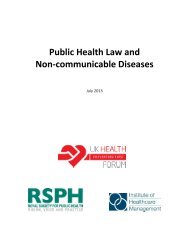The Challenge of Non-Communicable Diseases and Road Traffic ...
The Challenge of Non-Communicable Diseases and Road Traffic ...
The Challenge of Non-Communicable Diseases and Road Traffic ...
Create successful ePaper yourself
Turn your PDF publications into a flip-book with our unique Google optimized e-Paper software.
An Overview 5<br />
disability from RTI can throw a family further into<br />
poverty. Health systems are particularly challenged<br />
by care <strong>of</strong> chronic conditions which require a complex<br />
response over an extended time period. While<br />
medicines, such as insulin for diabetes, are essential<br />
in NCD prevention <strong>and</strong> treatment, their quality,<br />
safety <strong>and</strong> effective use are not assured <strong>and</strong> they<br />
make up a substantial part <strong>of</strong> the direct costs <strong>of</strong> care<br />
for chronic diseases. Evidence shows that availability<br />
may be worse for medicines for chronic diseases<br />
than for acute diseases, <strong>and</strong> that under-funding,<br />
poor planning, <strong>and</strong> inefficient procurement, supply,<br />
storage <strong>and</strong> distribution systems within the public<br />
sector may exacerbate the problem. Health service<br />
delivery systems in low- <strong>and</strong> middle-income countries<br />
(LMIC) are typically more suited to providing<br />
episodic care for acute conditions; models for delivery<br />
<strong>of</strong> care for chronic conditions may be unfamiliar<br />
<strong>and</strong> hindered by shortcomings <strong>of</strong> the system.<br />
Some <strong>of</strong> the potential solutions would benefit all<br />
disease groups. Universal health coverage aims to<br />
ensure that everyone has access to effective health<br />
services when needed, without incurring financial<br />
hardship; some countries have made significant<br />
progress in developing financial systems towards<br />
this goal. Shifting from originator medicines to generic<br />
products could achieve substantial savings<br />
without loss <strong>of</strong> quality, <strong>and</strong> a GAVI-like capacity at<br />
the regional or global level could usefully negotiate,<br />
make bulk purchases, <strong>and</strong> distribute vaccines, medicines<br />
<strong>and</strong> test kits. A health care delivery system<br />
that has been designed to decentralize <strong>and</strong> integrate<br />
chronic care across health care provider boundaries<br />
can span a spectrum <strong>of</strong> diseases with similar care<br />
needs, assisted by simplified protocols <strong>and</strong> treatment<br />
plans. Decision support tools for health-care<br />
pr<strong>of</strong>essionals can improve their adherence to guidelines,<br />
st<strong>and</strong>ardized case management <strong>and</strong> patients’<br />
outcomes. Performance-based funding can be used<br />
to incentivize providers towards public health goals,<br />
<strong>and</strong> more efficient use <strong>of</strong> resources with reductions<br />
in waste, errors <strong>and</strong> corruption could help gain<br />
‘more health for the money’. Innovative strategies to<br />
exp<strong>and</strong> health system capacity include ‘task-shifting’<br />
in clinical settings so that appropriate tasks are delegated<br />
to the lowest cadre <strong>of</strong> health worker with the<br />
ability to perform the task effectively – <strong>and</strong> even to<br />
people with the condition themselves. Finally, the<br />
application <strong>of</strong> ICT in health (eHealth), for example<br />
through telemedicine <strong>and</strong> distance learning, has<br />
the potential to facilitate better health care delivery<br />
in situations where health services <strong>and</strong> human resources<br />
for health are scarce.<br />
Some <strong>of</strong> these solutions have already been developed<br />
or implemented by other disease groups, <strong>and</strong><br />
NCDs <strong>and</strong> RTIs can benefit from this work. For<br />
example, many existing programs, such as TB control,<br />
aim to strengthen primary care in low-resource<br />
countries; there are opportunities for improvemed<br />
NCD care to ‘piggy-back’ existing efforts, by integrating<br />
services when an individual is seen by a<br />
health worker. <strong>The</strong>re is broad experience in implementing<br />
chronic care models for HIV/AIDS in Africa,<br />
<strong>and</strong> this may be transferable to NCDs. Systems<br />
for communicable diseases can be adapted, <strong>and</strong> existing<br />
health surveys <strong>and</strong> surveillance instruments<br />
can be exp<strong>and</strong>ed to measure NCDs <strong>and</strong> their risk<br />
factors. Rather than pursuing separate solutions,<br />
therefore, there are opportunities for initiatives to<br />
share resources <strong>and</strong> benefits.<br />
(v) Revisit governance for health<br />
Weak governance impedes work to improve health<br />
systems effectiveness <strong>and</strong> health outcomes generally.<br />
With the greater emphasis on prevention <strong>and</strong> the<br />
recognition that many <strong>of</strong> the solutions for NCDs <strong>and</strong><br />
RTIs lie outside <strong>of</strong> the health sector, broad partnerships<br />
across a range <strong>of</strong> sectors are needed. Political<br />
will, active civil society organizations, <strong>and</strong> research<br />
support are all significant contributors to success.<br />
Furthermore, underlying social determinants such<br />
as inequitable distribution <strong>of</strong> power, money <strong>and</strong><br />
other resources have implications for prevention <strong>and</strong><br />
care strategies, <strong>and</strong> both health <strong>and</strong> non-health sectors<br />
have roles to play in addressing these. <strong>The</strong>re is<br />
an opportunity to revisit the roles <strong>and</strong> terms <strong>of</strong> reference<br />
<strong>of</strong> Ministries <strong>of</strong> Health to allow them to play<br />
an oversight role <strong>of</strong> coordinating actions from other<br />
sectors to deliver health outcomes. <strong>The</strong>re are encouraging<br />
signs, for example with civil society organizations<br />
emerging to hold governments to account, <strong>and</strong><br />
increased recognition that population health is not<br />
the outcome <strong>of</strong> a single ministry but requires a wide<br />
range <strong>of</strong> actors <strong>and</strong> a synergetic set <strong>of</strong> policies.



